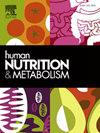正念饮食在饮食失调管理中的应用:一项文献计量学研究
IF 1.8
Q3 ENDOCRINOLOGY & METABOLISM
引用次数: 0
摘要
饮食失调(ED)的管理需要多学科的方法,整合医学,心理和营养护理。在这种背景下,正念饮食(ME)作为一种潜在的辅助方法来解决饮食失调,已经成为一个越来越受到关注的概念。本研究的目的是利用文献计量学分析,分析2000年至2025年饮食失调管理背景下与正念饮食相关的科学产出。研究方法采用定量、描述性和非实验性方法。文献计量学研究基于Scopus数据库中索引的一组具有代表性的科学文章。一个搜索字符串应用了年份、文档类型和语言的过滤器,以确保适当的选择。分析使用Bibliometrix (RStudio)进行文献计量测量,使用VOSviewer生成可视化、图形和数据映射。研究结果显示,科学产出显著增加,自2008年以来发表了91篇论文,年增长率为17.39%。这表明正念饮食已经成为一个日益增长的研究主题,经常与肥胖、体重、贪食症、厌食症和身体形象等相关概念联系在一起。该研究全面概述了当前的研究概况,为未来的临床应用调查奠定了基础,并为有针对性的干预措施提供了假设。本文章由计算机程序翻译,如有差异,请以英文原文为准。
Mindful Eating in the management of eating disorders: A bibliometric study
The management of eating disorders (ED) requires a multidisciplinary approach that integrates medical, psychological, and nutritional care. In this context, Mindful Eating (ME) has emerged as a concept gaining increasing attention as a potential adjunctive approach to addressing eating disorders. The aim of this study was to analyze the scientific output related to Mindful Eating in the context of eating disorder management from 2000 to 2025, using a bibliometric analysis. The methodology followed a quantitative, descriptive, and non-experimental approach. The bibliometric study was based on a representative set of scientific articles indexed in the Scopus database. A search string was applied with filters for year, document type, and language to ensure appropriate selection. The analysis was conducted using Bibliometrix (RStudio) for bibliometric measurements and VOSviewer for generating visualizations, graphs, and data mapping. The findings revealed a significant increase in scientific production, with 91 articles published since 2008 and an annual growth rate of 17.39 %. This indicates that Mindful Eating has become a growing research theme, frequently associated with related concepts such as obesity, body weight, bulimia, anorexia, and body image. The study offers a comprehensive overview of the current research landscape, providing a foundation for future investigations into clinical applications and informing the development of hypotheses for targeted interventions.
求助全文
通过发布文献求助,成功后即可免费获取论文全文。
去求助
来源期刊

Human Nutrition and Metabolism
Agricultural and Biological Sciences-Food Science
CiteScore
1.50
自引率
0.00%
发文量
30
审稿时长
188 days
 求助内容:
求助内容: 应助结果提醒方式:
应助结果提醒方式:


